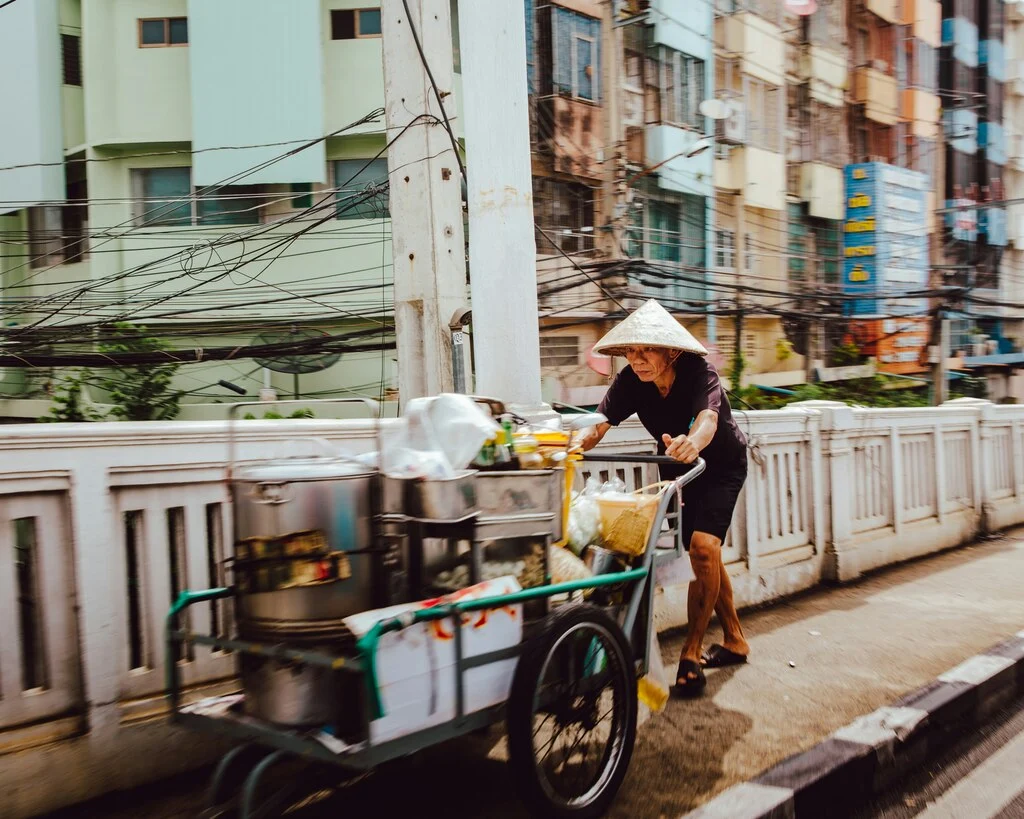Planning a trip to Thailand? It’s exciting to think about the beaches, temples, and delicious street food. But before you pack your bags, let’s talk about something important: vaccines for Thailand travel.
As a family of four, we’ve been living in Thailand since 2019. Before moving here, we also had to think about which vaccines we might need, and as Germans, we’re very cautious.
Thailand has so much to offer, but like any tropical destination, it also comes with health risks. Let’s dive into which vaccines for Thailand travel are essential and which ones depend on the specific region.
Health Risks in Thailand: Common Illnesses You Should Know About
In Thailand, many people face serious health issues. About 71% of deaths are caused by non-communicable diseases (NCDs) like heart disease, stroke, cancer, diabetes, and lung problems. That’s around 354,000 deaths every year.
Infectious diseases are also a big concern. Dengue fever is common, especially during the rainy season (May to October), with higher risks in the northeast.
Tuberculosis (TB) is another issue, as Thailand is among the 22 countries with the most TB cases. Crowded areas have a higher risk.
HIV/AIDS affects many people too. In 2022, over 500,000 Thai lived with HIV or AIDS. Sadly, 30,000–50,000 die from it every year.
Here’s a quick table summarizing the essential vaccines for Thailand travel—find detailed information about each one below!
General Vaccine Recommendations
Before your trip, make sure your routine vaccines are up to date. These essential vaccines for Thailand travel ensure you’re protected against preventable illnesses. Most of us got them as kids, but adults might need a booster now and then.
Here’s a quick rundown:
- Measles, Mumps, and Rubella (MMR): These serious diseases are still common in many parts of the world, including Asia. Staying vaccinated keeps you safe and helps prevent outbreaks.
- Diphtheria, Tetanus, and Pertussis (DTP): Tetanus can be picked up from cuts or wounds, even small ones. Pertussis (whooping cough) is highly contagious, and diphtheria is rare but serious. A booster every 10 years is often recommended.
- Polio: While polio is mostly eradicated, some regions still report cases. If you’re traveling with kids, ensuring they’re protected is a must.
- Influenza: Flu viruses circulate year-round in tropical countries like Thailand. Getting your flu shot can save you from being sick during your trip.

Recommended Vaccines for Thailand Travel
When considering vaccines for Thailand travel, a few essential vaccines are strongly recommended to protect you from preventable diseases that could turn your dream trip into a nightmare. Here’s a simple breakdown of what you might need, including doses and timing:
Hepatitis A
- Risk: Contaminated food or water.
- Doses: 2 doses.
- Spacing: The second dose is given 6–12 months after the first.
- Why it’s important: Provides long-term protection—up to 25 years.
- Approximate cost: $75–$100 (€70–€95) per dose.
Hepatitis B
- Risk: Spread through sexual contact, medical procedures, or exposure to infected blood.
- Doses: 3 doses.
- Spacing: The second dose is given 1 month after the first, and the third dose is given 6 months after the first.
- Why it’s important: Long-term protection is essential for higher-risk situations.
- Approximate cost: $50–$100 (€45–€95) per dose.
Typhoid
- Risk: Contaminated food or water.
- Doses:
- Injection: Single dose.
- Oral vaccine: 4 capsules.
- Spacing:
- Injection: No boosters needed for 2–3 years.
- Oral: 1 capsule every other day over 7 days (must finish at least 1 week before travel).
- Why it’s important: Protects for up to 3 years.
- Approximate cost: $30–$50 (€28–€45).
Japanese Encephalitis
- Risk: Mosquito-borne disease, especially in rural farming regions during monsoon season.
- Doses: 2 doses.
- Spacing: Doses are given 28 days apart.
- Why it’s important: Provides long-term protection for high-risk travelers.
- Approximate cost: $250–$300 (€235–€280) for the full series.
Rabies
- Risk: Bites or scratches from stray animals, such as dogs or monkeys.
- Doses: 3 doses (pre-exposure).
- Spacing: Doses are given on days 0, 7, and 21 or 28.
- Why it’s important: Pre-exposure vaccination makes post-exposure treatment easier and safer.
- Approximate cost: $200–$300 (€190–€280) for the full series.
Cholera
- Risk: Contaminated water, mainly in rural or flood-affected areas.
- Doses: 2 doses (oral vaccine).
- Spacing: Doses are taken 1–6 weeks apart. Finish the series at least 1 week before travel.
- Why it’s important: Provides protection for up to 2 years.
- Approximate cost: $30–$60 (€28–€55).
💡 Check out these amazing Bangkok hotels!
Optional Vaccines Depending on Travel Plans
Besides the must-haves, there are a few optional vaccines and precautions you might want to think about. These aren’t always necessary but can be a good idea depending on where you’re going and what you’ll be doing in Thailand.
Here’s a quick look at the optional vaccines and what they might cost:
Malaria Prophylaxis
- Important Note: Malaria does not have a vaccine but can be prevented with medication.
- Risk Areas: Low risk in most tourist areas, but higher in rural border regions (e.g., near Myanmar, Cambodia, and Laos).
- Preventive Measures:
- Use malaria prophylaxis like:
- Doxycycline: ~$20–$40 (€18–€35) for a full course.
- Atovaquone-Proguanil (Malarone): ~$50–$100 (€45–€95) for a full course.
- Avoid mosquito bites with repellent, nets, and protective clothing.
- Use malaria prophylaxis like:
- Timing: Start 1–2 days before entering a risk area, continue daily during the trip, and for 1–4 weeks after leaving the region.
Tuberculosis (TB)
- Who Needs It: Recommended for healthcare workers or those with prolonged exposure in high-risk areas.
- Risk: TB spreads through the air and is more common in rural Thailand.
- Dose: Single BCG vaccine dose (often given in childhood).
- Approximate Cost: $50–$70 (€45–€65) if required as an adult.
Yellow Fever
- Important Note: Yellow fever is not present in Thailand. Vaccination is only needed for travelers arriving from yellow fever-endemic countries.
- Who Needs It: Proof of yellow fever vaccine is required for entry if coming from an endemic area.
- Dose: Single lifetime dose.
- Approximate Cost: $150–$250 (€140–€235), depending on the clinic and region.
- Timing: Must be administered at least 10 days before arrival in Thailand if required.

Vaccination Timeline
When we were planning our trip to Thailand, we started looking into vaccines about eight months before we left. It gave us plenty of time to get everything sorted and feel confident we’d be protected. Here are some tips for your vaccination timeline:
- Start Early: Start planning your vaccines for Thailand travel about six months in advance. This allows enough time for:
- Vaccines that require multiple doses (e.g., Hepatitis B vaccine or Japanese Encephalitis).
- Your body to develop full immunity (some vaccines take a couple of weeks to become effective).
- Multiple Dose Vaccines: Some vaccines, like Hepatitis B, require three doses over six months, while Japanese Encephalitis needs two doses spaced 28 days apart. Planning early ensures you can complete the full series.
- Last-Minute Options: If you’ve left it late, don’t panic! Many vaccines can still be given closer to your travel date:
- Hepatitis A and Typhoid: Provide protection with just one dose and are effective within a few days.
- Rabies Pre-Exposure: You can start the three-dose series, but if you don’t complete it before traveling, post-exposure shots will still work effectively.
- Malaria Prophylaxis: Can be started just 1–2 days before entering a risk area.
Even if you’re short on time, it’s worth visiting a travel clinic to discuss your options. Vaccines can be tailored to your schedule, so you’ll have some level of protection for your trip. Don’t let last-minute planning stop you from staying safe!
Zika Virus and Pregnancy: What Travelers Need to Know
Zika virus is primarily transmitted through the bite of infected Aedes mosquitoes and poses significant risks, especially to pregnant travelers. Although global cases have declined since their 2016 peak, Zika transmission remains at low levels in several countries, including Southeast Asia. In Thailand, the virus has been detected in various regions, including urban areas like Bangkok’s Sathorn district, but the overall risk is considered low.
Pregnant women are particularly vulnerable, as Zika infection during pregnancy can lead to serious birth defects, including microcephaly and other brain abnormalities in the fetus. The highest risk of such defects is associated with infection during the first and second trimesters.
Given the absence of a vaccine or specific treatment for Zika, pregnant travelers are advised to avoid non-essential travel to areas with active Zika transmission. If travel is unavoidable, strict mosquito bite prevention measures should be followed, such as using insect repellent, wearing long-sleeved clothing, and staying in accommodations with screened windows and doors.
Thailand Travel Warnings for Pregnant Women: Regions to Avoid and Tips to Stay Safe
Alongside Zika, pregnant travelers should also be cautious of other mosquito-borne diseases in Thailand, including malaria and dengue fever.
Malaria is primarily present in rural, forested areas along the borders with Myanmar, Cambodia, and Laos. Major tourist destinations such as Bangkok, Chiang Mai, Pattaya, Phuket, and Ko Samui are generally free from malaria transmission.
Dengue fever is widespread throughout Thailand, with higher incidence during the rainy season from May to October. Urban and semi-urban areas are particularly affected.
Given these risks, pregnant travelers are advised to:
- Avoid rural, forested border regions where malaria transmission is prevalent.
- Exercise caution in urban areas due to the presence of dengue and reported Zika cases.
- Implement strict mosquito bite prevention measures, including using insect repellent, wearing long-sleeved clothing, and staying in accommodations with proper screening.

Common Risks and Prevention Beyond Vaccines
Beyond vaccines for Thailand travel, staying healthy also involves being mindful of food safety, mosquito protection, and animal contact. Here’s what to keep in mind:
Food and Water Safety
Be careful with what you eat and drink. Contaminated food or water can cause illnesses like Hepatitis A or Typhoid. Stick to bottled or filtered water. We never had problems with ice cubes and brushing our teeth with tap water, but I know of many people who avoid this.
Choose busy food stalls or restaurants where food is freshly cooked and served hot. Avoid raw or undercooked dishes, especially seafood or meat. Peel fruits yourself and skip salads washed in tap water in simple food stalls (in Western-style restaurants, you won’t have problems with raw veggies and salad).
Mosquito-Borne Illnesses
Mosquitoes in Thailand can carry diseases like Dengue Fever, Japanese Encephalitis, and Malaria in certain areas. Use insect repellents with DEET or picaridin, wear shirts with long sleeves at dawn and dusk (we call it “mosquito happy hour”), and sleep under a mosquito net in rural or high-risk areas. Staying in accommodations with screened windows or air conditioning can also help.
Animal Contact
Stray dogs, cats, and monkeys may carry rabies or other infections. Avoid touching or feeding animals, even if they seem friendly. Teach kids to keep their distance and move away slowly if approached. I must admit that we do pet friendly stray dogs, but we are always fully aware of the risks.
If you’re bitten or scratched, seek medical attention immediately—especially for rabies concerns. We’ve often come across incidents of dog bites, especially from stray dogs chasing and attacking scooters.
Where to Get Vaccinated
Getting the right vaccines before traveling to Thailand is easier than you might think. Here are some options to consider:
Travel Clinics
Travel clinics are a convenient choice for vaccinations before your trip. They specialize in travel health and can provide all the recommended vaccines. We went to a private vaccination center in Hamburg, Germany. Some popular international options include:
- Passport Health: Located in many countries, they offer pre-travel consultations and vaccines.
- NHS Fit for Travel Clinics: Available in the UK, these clinics provide vaccinations and advice tailored to your travel plans.
Local Hospitals in Thailand
If you’re already in Thailand or need a booster shot during your trip, many local hospitals offer vaccinations. Well-known facilities like Bangkok Hospital have travel health services, including vaccines for Hepatitis A, Rabies, and Japanese Encephalitis. They also cater to emergency vaccination needs, such as post-exposure rabies shots (attention, these are very expensive in Thailand!).
Insurance Coverage
Before booking your vaccines, check with your health insurance or travel insurance to see if they cover any costs. Some policies include coverage for:
- Routine vaccinations.
- Travel-specific vaccines like Hepatitis A or Typhoid.
- Post-exposure treatments (e.g., rabies shots).
Check out my travel health insurance comparison here.
Tips for Saving on Vaccines for Thailand Travel
- Shop Around: Prices vary by clinic or provider. Call ahead to compare costs.
- Travel Clinics: They often bundle services, which can save money.
- Employer Coverage: Some jobs, especially for frequent travelers, may offer reimbursement for travel-related health expenses.
👉 You might also find these articles interesting:
– What to Wear in Thailand?
– When is the Cheapest Time to Fly to Thailand?
– 35 Interesting Facts About Thailand
– The 8 Best Airlines to Fly to Thailand
– Living in Thailand with Kids
Final Thoughts on the Most Important Vaccines for Thailand Travel
Vaccines might not be the most exciting part of planning a trip to Thailand, but they’re so important. Trust me, it’s better to spend a little time now protecting yourself than risking your health later.
To sum it up, make sure your routine vaccines (like MMR, DTP, and Polio) are up to date. Add travel-specific ones like Hepatitis A, Hepatitis B, and Typhoid to your list. If you’re heading to rural areas or staying longer, think about Rabies, Japanese Encephalitis, or Cholera. And if malaria is a concern, plan for preventive medication.
But don’t stress—this isn’t something you have to figure out alone. A quick chat with your doctor or a travel clinic will give you a plan that fits your trip. They’ll know exactly what you need and when to get it.
Do you have any questions on vaccines for Thailand travel? Please let me know in the comments! I’m happy to help!
Thank you for reading and for making me part of your day! Yours, Lulu
FAQ About the Most Important Vaccines for Thailand Travel
Do I need proof of vaccination to enter Thailand?
Thailand does not require proof of vaccination for most travelers. However, if you’re planning which vaccines for Thailand travel to get, consult your doctor and check WHO guidelines. A Yellow Fever Vaccination Certificate, for example, is mandatory if you’re arriving from a country with a risk of yellow fever transmission. Check the World Health Organization (WHO) website for a list of yellow fever-endemic areas.
Are medical facilities in Thailand reliable?
Thailand offers excellent medical care, particularly in Bangkok and other major cities. Many private hospitals, such as Bangkok Hospital and Bumrungrad International Hospital, cater to medical tourists and offer English-speaking healthcare professionals. Many facilities also offer consultations on vaccines for Thailand travel if you’re unsure about your health needs during your trip. In smaller cities, facilities might be basic, so plan ahead for specific risks and bring essential medications.
Can children or pregnant travelers visit Thailand safely?
Yes, but extra precautions are needed. Pregnant women should avoid areas with Zika virus risk and consult their doctor about vaccines for typhoid fever, Hepatitis A, and influenza. Ensure children are up to date on routine vaccines, including Polio and MMR.
What should I do if I develop a high fever during or after my trip?
A high fever can signal a viral infection like Dengue Fever or Malaria. Seek medical care promptly at a reputable hospital. Thai people are known for their hospitality, and most hospitals provide easy access to translators and medical services.
Can I combine a trip to Thailand with medical tourism?
Thailand is a hub for medical tourism, offering affordable treatments for various medical conditions. Vaccinations, dental work, and cosmetic procedures are commonly sought after. Ensure you bring your medical history and discuss treatments with local healthcare professionals.
Just a heads up: some links in the article “The Most Important Vaccines for Thailand Travel” on Nomadmum.com are affiliate links. This means if you click and buy, I might earn a small commission at no extra cost to you.







